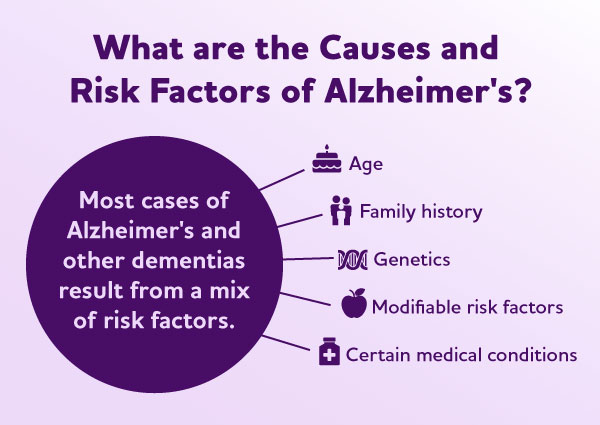
Triple Your Impact This Holiday Season
Triple Your Impact This Holiday Season
Celebrate the holidays with a year-end gift that can go 3x as far to help provide care and support to the millions affected by Alzheimer's disease, and to advance critical research. But please hurry — this 3x Match Challenge ends soon.
Donate NowWhat are the Causes and Risk Factors of Alzheimer's and Other Dementias?
Researchers believe that many risk factors play a role in causing Alzheimer's and other dementias, including genetics, behaviors and habits. While some risk factors, such as age and family history, may be set in their influence, there are many risk factors that can be changed to potentially reduce a person's risk of cognitive decline.
Age
The greatest known risk factor for Alzheimer’s and other dementias is increasing age, but these disorders are not a normal part of aging. While age increases risk, it is not a direct cause of Alzheimer's.
Most individuals with the disease are 65 and older. After age 65, the risk of Alzheimer's doubles every five years. After age 85, the risk reaches nearly one-third.
Learn more: 10 Signs of Alzheimer's, How is Alzheimer's Disease Diagnosed?, Visiting Your Doctor for Memory Loss
Family history
Another strong risk factor for Alzheimer's is family history. According to research, those who have a parent, brother or sister with Alzheimer’s are more likely to develop the disease. The risk increases if more than one family member has the illness. Modifiable risk factors such as sleep, smoking habits, hypertension or diabetes can further increase the risk.
Learn More: What Does Alzheimer's Do to the Brain?
Memory loss myth: Aluminum
During the 1960s and 1970s, aluminum emerged as a possible suspect in causing Alzheimer’s disease. This suspicion led to concerns about everyday exposure to aluminum through sources such as cooking pots, foil, beverage cans, antacids and antiperspirants. Since then, studies have failed to confirm any role for aluminum in causing Alzheimer’s. Almost all scientists today focus on other areas of research, and most experts believe aluminum does not pose any threat.
Genetics (heredity)
Scientists know genes are involved in Alzheimer’s. Two categories of genes influence whether a person develops a disease: risk genes and deterministic genes. Alzheimer's genes have been found in both categories. It is estimated that less than 1% of Alzheimer’s cases are caused by deterministic genes (genes that cause a disease, rather than increase the risk of developing a disease).
Learn more: Is Alzheimer's Genetic? and If You're Considering Genetic Testing for Alzheimer's (PDF)Head injury
Take charge of your brain health today
Positive, everyday actions can make a difference in brain health. Incorporate some or all of these habits into your life to help maintain a healthy brain.
Learn more: Traumatic Brain Injury (TBI)
Certain medical conditions
Some of the strongest evidence links brain health to heart health. This connection makes sense, because the brain is nourished by one of the body’s richest networks of blood vessels, and the heart is responsible for pumping blood through these blood vessels to the brain.
The risk of developing dementia appears to be increased by many conditions that also are not good for our hearts, including high blood pressure and diabetes. Work with your doctor to monitor your heart health and treat any problems that arise.
Ways to live healthy and reduce your risk of dementia
While age, family history and heredity are all risk factors we can't change, research shows we can influence other risk factors through healthy living and management of health conditions.
Research shows that incorporating healthy habits is beneficial for brain health and may reduce the risk of cognitive decline and possibly dementia. These measures include challenging your mind by learning new skills and staying sharp, building movement and exercise into your day, quitting smoking, eating right, maintaining a healthy weight and getting quality sleep.
Learn more: Can Alzheimer's Be Prevented?, Brain Health and 10 Healthy Habits for Your Brain
Latinos and African Americans at risk
Research shows that older Latinos are about one-and-a-half times as likely as older whites to have Alzheimer’s and other dementias, while older African Americans are about twice as likely to have the disease as older whites. The reason for these differences is not well understood, but researchers believe that higher rates of vascular disease in these groups may also put them at greater risk for developing Alzheimer’s.

The first survivor of Alzheimer's is out there, but we won't get there without you.
Donate Now
Learn how Alzheimer’s disease affects the brain.
Take the Brain Tour
